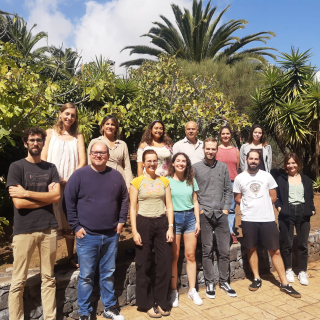Bibcode
de Lorenzo-Cáceres, A.; Falcón-Barroso, J.; Vazdekis, A.
Referencia bibliográfica
Monthly Notices of the Royal Astronomical Society, Volume 431, Issue 3, p.2397-2418
Fecha de publicación:
5
2013
Número de citas
36
Número de citas referidas
34
Descripción
Numerical simulations of double-barred galaxies predict the build-up of
different structural components (e.g. bulges, inner discs) in the
central regions of disc galaxies. In those simulations, inner bars have
a prominent role in the internal secular evolution of their host
galaxies. The development of bulges and inner discs is, however, poorly
understood observationally due to the small number of studies focusing
on the stellar populations of these systems. In order to provide
constraints on the relevant processes inducing the creation of these
components in the presence of inner bars, we have carried out a detailed
kinematical and stellar population analysis in a sample of four
double-barred galaxies, ranging from SB0 to SBb, observed with
integral-field spectroscopy. We find that the inner bars present
distinct stellar population properties, being younger and more
metal-rich than the surrounding bulges and outer bars. While we detect
signatures of gas inflow through the inner bars, we find no evidence of
associated star-forming regions or newly formed structures around them.
This result suggests that, regardless of their formation scenario, at
present these inner bars are playing a moderate or even a minor role in
the morphological evolution of this sample of double-barred galaxies.
Proyectos relacionados

Huellas de la Formación de las Galaxias: Poblaciones estelares, Dinámica y Morfología
Bienvenida a la página web del g rupo de investigación Traces of Galaxy Formation. Somos un grupo de investigación amplio, diverso y muy activo cuyo objetivo principal es entender la formación de galaxias en el Universo de una manera lo más completa posible. Con el estudio detellado de las poblaciones estelares como bandera, estamos constantemente
Ignacio
Martín Navarro